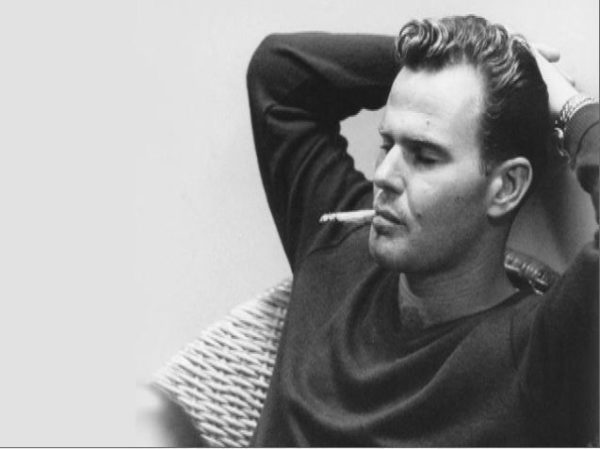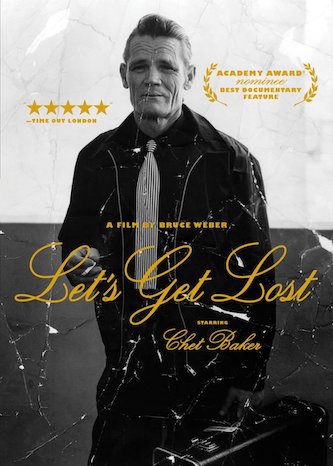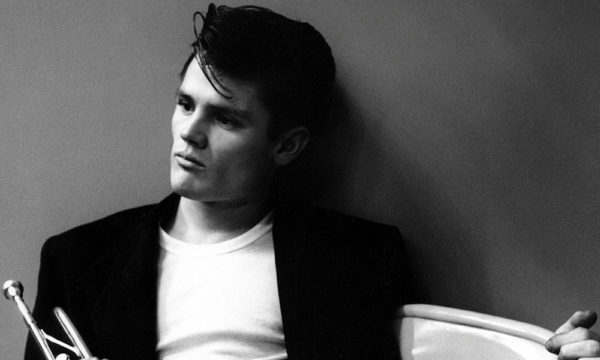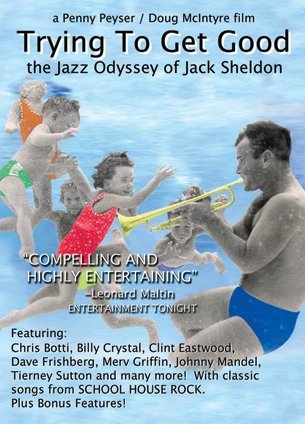Jazz Commentary: Jazz and the Single Trumpet Player
By Steve Provizer
Far more people would recognize Chet Baker’s name than Jack Sheldon’s — and that is unfortunate.

Trumpeter Jack Sheldon in the ’50s. Photo: Alcheton.
Jack Sheldon (November 30, 1931) and Chet Baker (December 23, 1929- May 13, 1988) were trumpeter/vocalists with a great deal in common. They spent their years of jazz apprenticeship, the early ’50’s, on the West Coast, largely in L.A. Their musical styles and career paths early on were similar, although Baker began recording earlier and more prolifically than Sheldon, making considerable waves performing with Gerry Mulligan’s group. Eventually, Sheldon and Baker played at the same sessions, recording with each other as well as with such West Coast mainstream stalwarts as Art Pepper, Jack Montrose, Carson Smith, and Chico Hamilton. Both saw drugs and booze as natural allies and loved to party — often, together
The resemblance raises an interesting issue. I would say that Sheldon’s reputation is slightly higher than that of Baker’s in the world of jazz musicians, but the opposite is true in terms of the world at large. I don’t have any concrete specifics in terms of records sold, files streamed, or views on YouTube but, outside of the insular world of jazz, but far more people would recognize Baker’s name than Sheldon’s.

No qualitative difference in their artistry explains the discrepancy. Nor is this is a case of Sheldon being a “musician’s musician,” someone whose playing is too esoteric, too ecstatic, or too subtle for the general public to appreciate — au contraire. My theory is that cultural feedback loops, the creation of a marketable ‘image,’ exert low level magnetic pulls, inviting listeners to draw different conclusions about each man’s comparative value as a musician.
Each performer has inspired a documentary: Jack Sheldon is the subject of Trying to Get Good; trumpeter Chet Baker is the focus of Let’s Get Lost. In terms of their look, style, and content, these films are generally accurate representations of contrasting lives. Comparing the films helps us understand how these magnetic cultural forces played out.
In 1988’s Let’s Get Lost, directed by Bruce Weber, a well-known fashion photographer, both historical and current footage of Baker is presented via high contrast black and white that gives the documentary a glamorous, noir-ish aspect. To me, the stark visuals reflect an attempt to transform Baker into an example of iconic decadence. There is the contrast set up between the young handsome Chet and the ’80s debauched and seedy Chet. There is the juxtaposition of the low-affect, sporadically-stoned Chet and the winsome, carefree presentation of Baker’s lifestyle in his later years. His face is lined and weathered well beyond his 57 years; he is seen strolling along the beach at Malibu, zipping along the highway in a convertible with a good-looking paramour, and hanging out with a batch of attractive, adoring young people. A scene shot in the recording studio captures him struggling to sing “Imagination,” and there’s a party scene where he explains that his preferred blend of opiate cocktail is the speedball. At a performance shot in France, Chet says before going on stage, “People couldn’t care less about the music.” The only one of his musical peers in the film who comments on Baker is Sheldon, who talks amusingly about Baker sleeping with his girl and how easy playing came to “Chettie” and how much he, Sheldon, had to struggle.

Chet Baker in the ’50s.
Trying to Get Good, released in 2008, is shot in color. The spine of the film follows Sheldon’s performance at a 71st birthday concert at the Beverly Hilton Hotel in November, 2002. He looks beefy but robust. The filmmakers are not afraid to show a lot of close-ups; Sheldon sweats fairly profusely. (If Baker sweats, I’ve never seen it.) Sheldon plays and sings very well, the power of the performance belying his years. His comedic timing is impeccable. Historical footage is also mostly in color, except for very early photos of him and his mother. Unlike the Baker film, Trying to Get Good is packed with fellow musicians commenting on Sheldon’s sense of humor, his eccentricities, and his great musicianship. Instead of allure, the overall feeling is of humanity and pride in accomplishment, tempered by dabs of innate insecurity.
There is an irony here. Sheldon’s early life was much more fraught than Baker’s. His father left the family early on; his mother trailed him across the country, trying unsuccessfully to reconnect with him. Baker’s father was a musician and his family was intact. Neither man was an attentive father, to put it mildly. All of Baker’s kids made it to adulthood, while two of Sheldon’s children had untimely deaths, In Weber’s Let’s Get Lost the footage of Baker’s family, shot in Oklahoma, looks like scenes in a reality TV show before the genre was invented.
Neither film gives viewers a solid impression of the music the men made in their prime. So it is instructive to take a closer look at their musical virtues. The link between the way someone plays and the way it’s received by a listener is ineffable — but technical comparisons can be made.
Both players developed distinctive sounds that are recognizable quickly. I’d describe Baker’s trumpet playing as somewhat plaintive, with little vibrato, especially early on in his career. His range was rather limited but his sound was consistent, from the bottom to the top. He used the bottom of the trumpet range often and seldom played above the staff. Baker had a keen ear and a swift tongue; he could negotiate chord changes with speed and dexterity. His style remained pretty much unchanged throughout his career.
In contrast, Sheldon’s playing altered considerably over the course of time. At the beginning, he sounded very much like Baker. But, in his maturity, his sound became different in different registers — smokier on the bottom and brassier at the top. It has a more supple quality than Baker’s, with a wider variety of colors. His high range was stronger and higher. He sometimes used a heavy vibrato and pinched off his notes, especially on ballads. Sheldon could also negotiate chord changes easily. While his sound is individual, overall, it’s closer to the extroverted sound of other trumpet players than Baker’s.
Both musicians sang. I wrote about Baker’s singing elsewhere for the Arts Fuse. In a nutshell, he had a very light, intimate, almost feminine voice — it was very in sync with his playing. He sang consistently between a mezzo-piano and mezzo-forte volume. When Sheldon sang, he “put across” songs. He was more expressive and tried to put sexiness in his voice for ballads. He had more control over volume and could sing forcefully or in a whisper. Sheldon was more overtly emotional than Baker.
There was considerable difference in their looks. Baker was an extremely attractive man with chiseled features, thick hair, and a fairly frail looking body. Sheldon was a bit stockier — not quite in the teddy bear category. He was pleasant looking, with a less impressive head of hair than Baker. (cf. See Sheldon’s joke about Baker stealing his girlfriends.) His face had a more open quality.
As personalities, much has been written about Baker and much less about Sheldon.
Both were substance abusers — marijuana and booze initially for both. Later came combinations of meth, heroin, and cocaine for Baker, and lots of booze and cocaine for Sheldon. Baker continued to use until his death. Sheldon recognized his alcoholism in middle age, and then went on the wagon.
It seems as if Baker never had an uncomplicated relationship. There was always something dynamic, often problematic going on with everyone around him — friend or lover. This was more and more the case as he went more deeply into heavy drug use. On stage, he talked very little. Sheldon was a natural comic, both onstage and off. He came across as a very jovial guy, albeit one with a wild side, especially during his drinking years. He was prone to practical jokes, the kind of eccentric behavior that might qualify him as a hippie ahead of his time. Baker served hard time because of his drug habit; Sheldon avoided incarceration.
Baker made a brief foray into films when he was young and handsome, but was never much of an actor. Sheldon was very interested in acting, although his one foray into an acting class ended in disaster. Ultimately, however, he did a lot of acting on television (often seen in Dragnet), was a stalwart musician/entertainer on the Merv Griffin television show for many years, and has continued to work consistently as a trumpeter, singer, and actor.
 Stepping back, we see two guys of the same generation who were pretty much equals in terms of how well they played the trumpet. Both men had long careers — Baker about 40 years (off and on) and Sheldon consistently for 60-65 years. One had the clear edge on looks. Both exhibited self-destructive behaviors, although one recognized that and got clean.
Stepping back, we see two guys of the same generation who were pretty much equals in terms of how well they played the trumpet. Both men had long careers — Baker about 40 years (off and on) and Sheldon consistently for 60-65 years. One had the clear edge on looks. Both exhibited self-destructive behaviors, although one recognized that and got clean.
For me, the mythology of Baker as ‘outlaw’ has created the difference in their public reputations — not their music. The Baker’s image was cooked up by an advertising and commercial machine that piggybacked on his looks and “bad boy” image in order to turn him into an archetype of the “romantic” jazz figure. Sheldon was far from white bread, but his “availability” as a person, his broad smile, and comic precocity are not the stuff from which an alluring jazz mystique can be cooked up. In this storyline, Baker plays the ill-fated ‘romantic’ lead and Sheldon, even though he arguably plays the better trumpet, was selected for the role of trusty comic sidekick.
Personally, I’d rather hang out with Sheldon than with Baker, with whom I actually did hang in D.C. As far as for whose music I prefer, that depends on my mood. It’s a shame that people can’t choose for themselves because, in this case, the publicity machine has chosen for them.
Steve Provizer is a brass player and bandleader who has been blogging about jazz for 15 years and written about the music for many publications.

in broad stylistic terms Chet sounds like the School of Pres, Jack generally from Armstrong via Harry James, also Berrigan maybe
This is a longer and more complicated conversation, but short version-I don’t really see it that way. Chet’s phrasing is more like his heroes Dexter and Wardell, who, while influenced by Prez, had moved away from him by the time Chet heard them. Sheldon was initially on that same vector, but ultimately, yes, he came through the Pops lineage.
We should not forget the deep influence SHORTY ROGERS had on CHET BAKER and JACK SHELDON’s early playing, as well as other WEST COAST players of the day. – JOE PARKER – Chandler Az.
Hi Joe,
Dory Kamuca Atkinson here.
Possibly u knew my late husband Richie Kamuca.
I live in Gilbert, Az.
Since you are in Chandler,
question..
Know of any good jazz in the area
Many thanks
Dory-Your husband was a great musician. Hope you find some good music in your area.
Jack Sheldon was also star of a brief-lived TV series, “Run, Buddy, Run!”
My introduction to Jack Sheldon was when I was bedridden for nearly a year at age 14 in 1972-73, and religiously watched Merv Griffin’s morning talk show. At the beginning of most shows, Merv would go up on the bandstand and talk to Jack. They would joke around some, talk about music, intro the other guys on the bandstand, etc. I’ve been a fan of Jack ever since.
I got turned on to Jack from the School house rock show.
I got to appreciate his music from that point in my young life.
Chet was just a character by the time I had a taste for Jazz.
To me the Shaddow of your Style is a classic for Jack Sheldon and even Marvin Stamm.
Great story.
Jack is our next door neighbor. His health has suffered lately but I still hear him play now and again as I sit in the backyard. It is wonderful to hear him play. Our other neighbors who have lived here longer have told me stories about some of his parties, and I’m so jealous. But it’s great to hear a true legend every once in a while.
Jack Sheldon admitted to being inspired heavily by “Chetty” as he was called back them.
I first heard Jack Sheldon when I was in high school in the 1950s. It was as a side man with Jimmy Guiffre he recorded “Tangents in Jazz” and I was hooked on his playing. He was perfect with Giuffre. Then I went out and got his quartet recording and the quintet with Zoot Sims. 60 years later those two ablbums still get a lot of play in my house. The Tangents album I lost but found the Lp again in England about 40 years ago. I like on vinyl better than the CD that I bought for my daughter. Sheldon deserve more recognition than he has gotten over the years. That’s just the luck of the draw.
Thanks, everyone, for your comments. Clearly, Jack has a deep and knowledgeable fan base. and has touched a lot of people. I agree that Shorty Rogers was important to the formation of their sound., I also put Shorty in the large category of unsung jazz arranger heroes.
Both great players, good singers and exceptional jazz personalities…
That stated, I was never into either…I couldn’t get into Chet because
of all of his ongoing drug bust nonsense…in those days, it seemed like
there was something in the papers or tv daily!
Until Jack started being seen on tv, I really didn’t know much about
him!
I will say that Jack performing with Ross Tomkins, at the piano, incentivized
me to start my own duo and concentrate on singing, playing and comedy!
Luis Gasca introduced me to Chet and one of his sons at a Hollywood Motel
where we had been visiting Joe Farrell!
Rich-Thanks for the comment. In terms of Chet, you seem to be pulling against the truism that there’s no such thing as bad publicity. Cool that Jack inspired you. He is a guy full of life.
Jack loved Diz!
True dat.
Steve-great job !
I used to see Jack at Jax in Glendale .
Man he used to get away w/ some great
off color Jokes ! He would bust up the crowd.
The poor people who sat in front might get good !
He played great and gave his sidemen plenty of room
to show their stuff.
Nice article-I miss him-he was a great comedian too !
I was fortunate to catch Jack Sheldon frequently on the LA Jazz Club circuit & relished every moment often for 3 sets & wanting more…… whereas I only know ‘Chet from His albums which I love… ‘Specifically Chet’s ballad endeavors as in Matt Dennis & Tom Adair’s (1940) “Everything Happens To Me” written for Tommy Dorsey ‘Rembrandt Chet Baker Jazz moments for me with His unique scatting & all.